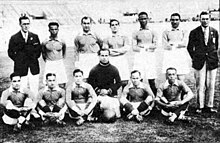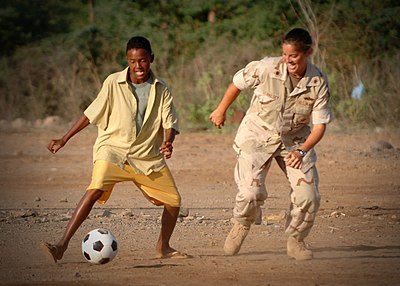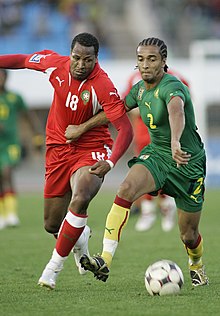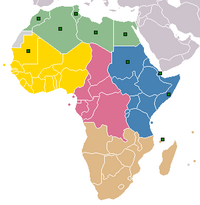Portal:Football in Africa
Introduction
Football is the most popular sport in Africa. Indeed, football is probably the most popular sport in every African country, although rugby and cricket are also very popular in South Africa. (Full article...)
This section may be unbalanced toward certain viewpoints. (October 2022) |

Selected article -
The Algeria national football team (Arabic: منتخب الْجَزَائِر لِكُرَّةُ الْقَدَم) represents Algeria in men's international football, and is governed by the Algerian Football Federation. The team plays their home matches at the 5 July Stadium in Algiers and Miloud Hadefi Stadium in Oran. Algeria joined FIFA on 1 January 1964, a year and a half after gaining independence. They are the current champions of the FIFA Arab Cup.
The North African team has qualified for four World Cups in 1982, 1986, 2010 and 2014. Algeria has won the Africa Cup of Nations twice, once in 1990, when they hosted the tournament, and again in Egypt in 2019. They were also champions of the 2021 FIFA Arab Cup, the 1991 Afro-Asian Cup of Nations, the men's football tournament of the 1978 All-Africa Games and the men's football tournament of the 1975 Mediterranean Games.
The traditional rivals of Algeria are mainly: Egypt, Morocco, and Tunisia. Algeria has also had very competitive matches against Nigeria, especially in the 1980s during Algeria's best football generation, against Mali due to sharing a common border and a long-standing competitive rivalry, and against Senegal, where Algeria's first global success began. For the Algerians, their biggest victory on the world stage was their 2–1 win against West Germany during the 1982 FIFA World Cup in which the African nation shocked the world. Algeria has produced many talented players throughout its history and is considered one of the best teams in African football history. At the 2014 World Cup in Brazil, Algeria became the first African team to score at least four goals in a match at a World Cup, which was against South Korea.
Selected biography -
Adebayor represented the Togo national team at the 2006 FIFA World Cup in Germany, the country's début, and to date only, appearance at the World Cup. In January 2010, Adebayor was one of the players involved when the Togo team's bus came under gunfire on the way to the 2010 Africa Cup of Nations in Angola, after which he retired from national team duty. In 2013 he returned to the Togo team for the 2013 African Cup of Nations in South Africa, where he helped them to qualify for the quarterfinals. He is currently Togo's all-time top goalscorer with 27 goals.
Selected image -
 |
A U.S. Navy lieutenant plays football with a Djiboutian boy at an orphanage in Djibouti City. Football in Djibouti is controlled by the Djiboutian Football Federation and the nation has been a member of FIFA since 1994.
Subcategories
Related portals
More sports portals
WikiProjects
Related task forces and sub-projects
African football task force
WikiProject Africa • WikiProject Football
WikiProject Football task forces and sub-projects
- Africa
- Argentina
- Australia
- A-League
- England
- Arsenal
- Liverpool
- Manchester United
- Non-league
- Sheffield United
- Sheffield Wednesday
- France
- Germany
- FC Bayern Munich
- Hong Kong
- India
- Iran
- Ireland
- Italy
- Netherlands
- Scotland
- Celtic F.C.
- Spain
- Sweden
- USA & Canada
- D.C. United
- Sounders FC
- Season articles
- Variants of football
- Women's football
- College soccer
| Wikipedia ads | file info – #250 |
Topics
Open tasks

- Expand stubs: Competitions in Africa • Organizations
- Expand club articles of teams from Africa.
- Expand biographies of Africans involved in football.
- Create: Requested articles • Most wanted football articles • Requested general football articles
- Add: Infoboxes • Images (General requests, Requested images of people)
- Review: articles currently under review
- Assess: Assessment requests • Assess an article
- Revert vandalism on this portal and on African football articles
- Assist in maintaining this portal and keeping its selected content up to date.
- WikiNews: Create and submit news stories about African football for Wikipedia's sister project WikiNews.
Associated Wikimedia
The following Wikimedia Foundation sister projects provide more on this subject:
-
Commons
Free media repository -
Wikibooks
Free textbooks and manuals -
Wikidata
Free knowledge base -
Wikinews
Free-content news -
Wikiquote
Collection of quotations -
Wikisource
Free-content library -
Wikiversity
Free learning tools -
Wiktionary
Dictionary and thesaurus
More portals
-
List of all portals
-

-

-

-

-
WikiProject Portals
Sources

- ^ "The History Of Soccer In Africa". NPR.org. 2010-06-09. Retrieved 2016-03-31.
- ^ a b c Alegi, Peter (2010). African Soccerscapes. Ohio University Press. pp. 1–2. ISBN 9780896802780.
- ^ Frimpong, Enoch Darfah. "Ghana news: A world of superstition, frustration and disillusionment - Graphic Online". Retrieved 23 September 2017.
- ^ Lacey, Marc (8 August 2002). "Kangemi Journal; For Spellbinding Soccer, the Juju Man's on the Ball". The New York Times. NY Times. Retrieved 2016-03-31.
- ^ "World Cup Witchcraft: Africa Teams Turn to Magic for Aid". National Geographic. Archived from the original on July 10, 2006. Retrieved 2016-03-31.
- ^ Andy Mitten (September 2010). The Rough Guide to Cult Football. Rough Guides UK. ISBN 9781405387965. Retrieved 2016-04-02.
- ^ "African Nations Cup overshadowed by hocus pocus | Football". The Guardian. Retrieved 2016-04-09.
- ^ Kuper, Simon (2006). Soccer Against the Enemy: How the World's Most Popular Sport Starts and Stops Wars, Fuels Revolutions, and Keeps Dictators in Power. Nation Books. p. 123. ISBN 978-1-56025-878-0.
This page was last updated at 2024-05-24 22:14 UTC. Update now. View original page.
All our content comes from Wikipedia and under the Creative Commons Attribution-ShareAlike License.




















